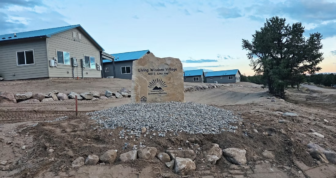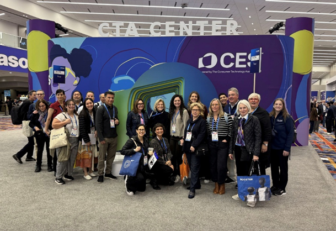By Rach Angard, Community Impact Coordinator, Next50
“This is March 2020…but there’s no ARPA coming,” Pam Brewer, Director of Development at Homeward Alliance, told me. “This is March 2020 and instead of gearing up for more federal funding coming our way, it’s all getting pulled back.”
This moment is a harsh parallel to the onset of COVID. It is a moment defined by the same feelings of fear for the stability of organizations and the people being served. But this time, the pain is coming from the top. As the current administration slashes funding, rescinds grants, and rolls back financial support of nonprofits, organizations across the country are struggling. In Colorado alone, more than 34,000 nonprofits comprise the sector, contributing roughly $62 billion to the state’s economy. According to the Governor’s office, the Trump administration and Congress have already canceled or failed to renew nearly $750 million in federal funding, with $25 million more still at risk.
In response, Next50 created the General Operating Aging (GO Aging) grant. These funds provide five years of unrestricted, general operating support to help eight organizations navigate the economic uncertainty brought on by shifting federal and state policies, funding cuts, and the pullback of corporate partners.
This August, Next50 facilitated a conversation among five of our Colorado-based GO Aging recipients to discuss funding cuts, programmatic uncertainty, and the impact on the older adults they serve; to talk over what foundations can do to alleviate the current financial precarity; and to share the work they do with older adults. Parts of this conversation have been edited and condensed for clarity.
We spoke with Marlene Bedoya and Nikki Koster from Justice and Mercy Legal Aid Center (JAMLAC) in Denver, which provides legal services to underserved communities, with a particular focus on the Hispanic/Latino population. Paula Schriefer, the President & CEO of the Spring Institute for Intercultural Learning in Denver, shared about the programs and services they provide to support immigrant and refugee communities. Meg Genevie from Rocky Mountain Equality in Boulder spoke with the group about the LGBTQ+ older adults to whom she provides mental health care. Mountain Resource Center in Conifer, an organization serving low-income, rural older adults, was represented by its CEO Sarah Kinzer. Pam Brewer joined us to speak about the homeless services provided by Homeward Alliance in Northern Colorado.
Each of these organizations serves historically marginalized populations, especially those disproportionately targeted and impacted by executive actions. The GO Aging recipients shared the fears that they and their communities are facing, fears which are felt acutely among immigrant and refugee populations.
PAULA: Even refugees who have attained citizenship, which is the highest level of protection, are extremely nervous that their citizenship will get revoked.
MARLENE: Even people who qualify for services are afraid to access those services because –
PAULA: The system is broken.
MARLENE: Exactly.
PAULA: People were told that their immigration status is never shared. It’s a completely separate part of the US government from immigration enforcement. And now they’re sharing that information. People have a right to be mistrustful at this point.
MARLENE: They are so afraid to get the services. Even if they qualify for services, they’re like, “I prefer not to do it.”
Both Spring Institute and JAMLAC have seen a drop in the utilization of critical services, opening the door for other negative ramifications. Nikki Koster shared that cases of domestic abuse have increased while reporting to law enforcement of that abuse has decreased, often due to fear of deportation of their family members or themselves. For older adults who identify as LGBTQ+, live in rural areas, or deal with homelessness, this fear shows up as isolation and loneliness – or simply living in survival mode.
MEG: We’re seeing an increase in loneliness and isolation and general mental health concerns [among LGBTQ+ older adults]. There’s always something new coming out [in the news], so I think every day it compounds and gets a little more severe.
SARAH: I would echo the isolation and the loneliness. For a lot of our community and the rural nature of it, transportation is a huge issue. So people really shut down in a way that is detrimental to their mental health.
PAM: Our [homeless older adults] are in survival mode, right? What we’re seeing is fear that there’s an executive order to cut Medicaid or food stamps, and they think, Is that going to be tomorrow? I’m not going to have enough to eat.
With so many vulnerable demographics of older adults being affected by an uncertain and often hostile environment, it is crucial for organizations to tap into as many fiscal streams as they can. However, they aren’t just seeing cuts in federal and state funding. Due to market volatility and public pressure, they are also losing resources from individual and corporate donors.
SARAH: We’ve seen a big drop-off in donations. It usually held steady around the same dollar amount every year, and we’re about $50,000 short of that. A lot of that comes from fear – people are worried about their own financial situation.
PAULA: We don’t have a huge individual donor base, and early on we were really panicking because it is so much harder to get sponsorships this year than it ever has been. I think you’re starting to see corporations thinking about publicity and if they are supporting an organization that’s been targeted by the federal government.
MEG: Our community has really stepped up to support us.
PAM: We got a small donation from someone who said, “Thank you for upholding democracy.”
MEG: People want to help. They’re just not sure how to help.
This loss of dollars from all funding streams puts a strain on these organizations that provide crucial services for older adults. This strain leads to a loss of staff, a loss of services, and a loss of clients.
MARLENE: At the beginning of the year, we were at risk of losing fourteen staff members. Fourteen staff members equals eight hundred cases. If we lose them, we have to decrease the number of people that we help.
PAULA: We have no bench strength as it is. So when you lose infrastructure, you lose capacity that is really hard to regain.
Nonprofit organizations serve a vital role in the lives of individuals, communities and in the fabric of this country. As all of our GO Aging recipients echoed, the United States is unique among developed countries: it is a nation that relies on non-governmental agencies to provide critical services to our fellow citizens, particularly older adults. With the ripple effects of funding cuts in the public and private sector, there is the potential that these services will go away. That this industry will crumble if not disappear. That untold numbers of people will struggle and suffer.
At a dire time like this, what can foundations do? How can foundations fill some of the gaps created by our current administration?
Foundations can provide unrestricted, general operating support. As Jillian Kelly, Next50’s Vice President of Impact, recently wrote, nonprofits have made it clear that this is the support they need to create the most impact in their communities. Nonprofits need the trust and the funds necessary to be effective and flexible in this unstable time.
PAM: Unrestricted funding is justice. It’s saying, “You nonprofits are in the trenches. We’re going to give you money and you invest it how you think works.”
MARLENE: No one knows our community better than us. No one knows how to serve our community better than us. And what works for one organization isn’t going to work for another organization. That’s why it’s so important to have this unrestricted funding.
PAM: We waste time, money. We could achieve much better outcomes if there were a lot fewer restrictions [in funding requirements].
MEG: There’s so much time spent making sure that you’re following these guidelines. If we didn’t have to spend all of our time doing that, we could have much more time with boots on the ground.
SARAH: I don’t know why the trust is so low. That’s what it feels like. … And one of the things I equated it to not that long ago – donors came in and would buy the presents they would want their children to have for the holidays. We made a change to say, “No. We’re just going to give our families money during this time of year so they can spend it on what they need.” Whether that be clothing, toys, food. They know their needs. They know what they want. Foundations are that way: they want to buy the gift that’s the shiny bike and nobody needs a bike.
This moment is like a difficult holiday; a holiday where we are pinching pennies. It is time for foundations to stop buying bikes that nonprofits cannot ride. It is time for foundations to give a card with cash inside and a message that simply says, “Happy Holidays.”
When foundations offer unrestricted, general operating funding, everyone wins. Nonprofits can be nimble and responsive to an ever-changing political climate. Clients can have access to critical needs and services. And, in the case of Next50’s grantees, older adults can thrive.
PAULA: What I think is really interesting about older adult immigrant and refugees is how almost all of them come from countries where older adults are venerated and respected and taken care of, and they come to the US where older adults are not respected, are not taken care of. In our English classes, they were all laughing and supporting each other. Even though they’re all from different countries, language backgrounds, etc., they all feel so much more comfortable together in a group.
SARAH: We serve a lot of veterans in our community, and we have a veteran’s breakfast. It’s just so valuable for them to come in and tell us all these stories because it’s preserving something that is getting lost.
MARLENE: I like to hear the stories. I like to see that they are resilient, they are wise. They are people who want to contribute to their community. They are culture keepers.
MEG: When you can engage older adults and you can create this space, there’s still a lot of joy to be experienced. To be able to see that and see the community that can be built is really cool.
Next50 is proud of our commitment to help organizations serving older adults survive this uncertain environment. We know that general operating dollars provide the flexibility needed to respond when things change at a moment’s notice. We know that with unrestricted funding, even fifty dollars can make the difference in turning someone’s entire life around.
PAM: We were looking for an older woman who found out she was chosen to get permanent supportive housing. And we couldn’t find her. One of our front desk ladies went out and drove around, trying to find her. Turned out, she was in jail. She was in jail because she couldn’t pay the fifty-dollar bail. So we used our flexible funds to get her out of jail. She moves in tomorrow. That fifty bucks, it’s not a lot, but it got her out of jail and got her into housing. And that’s the kind of thing that flexible funding can support.
Thank you to all of our GO Aging recipients. Next50 is proud to be a partner in the work you do to improve the economic well-being of older adults and create a world that values aging. Homeward Alliance, Justice and Mercy Legal Aid Center, Mountain Resource Center, NorthWest Colorado Center for Independence, Rocky Mountain Equality, Savings Collaborative, and Spring Institute for Intercultural Learning.




